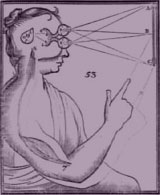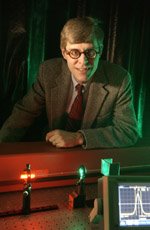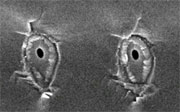
a new study from researchers at harvard and u chicago asks the question "
how do children learn about science and god?" (link to press release).
while the researchers find things like 'children add interpretation to learned items', the most interesting conclusion (to me, at least) was that children are more confident about the scientific information they learn than the religious information. from the press release:
"We don't have a firm view on why it is they're a bit more confident on the scientific information," says Dr. Harris, "but one possible plausible reason is that when we talk about things like germs or body organs, we talk in a very matter-of-fact fashion. We don't say, "I believe in germs," we simply take it for granted that they exist." In talking about religion and other spiritual matters, however, adults tend to assert the existence of God more strenuously, possibly raising doubts in children's minds as to the existence of an unseen deity.a few points of interest:
1) i wonder whether harris meant "tenuously" rather than "strenuously". it's remarkable enough that children can learn a particular item of knowledge. but here, they're also learning meta-knowledge, that is, to what extent an item of knowledge represents the actual world. but harris's suggestion about "strenuous assertion" would require the sociological acuity of a nathaniel hawthorne...at childhood! her claim amounts to the following:
a) the kid encounters an item of knowledge.
b) the kid remembers it.
c) the kid evaluates the fervor with which the teaching adult spoke and makes the following judgment:
c1) if spoken stolidly, believe it.
c2) if spoken without confidence, don't believe it. (this is not explicit from their research)
c3) if "strenuously asserted," question it. the adult is probably insisting on it because it ain't true.it's hard to construct an environmental or even a common social situation in which encountering and recognizing such a form of subtle reverse psychology directly from the teacher would be evolutionarily advantageous. indeed, it seems that this assertion (kids question things that adults insist on) requires some hoop-jumping in order to be reconciled with another evolutionary argument, the common claim of
religion-as-human-construct. in particular, how can humans be inclined both
to doubt what they're told about religion, and
to accept what they're told about religion? (well, there are at least a few creative ways to claim that both are simultaneously true, but i'll curb the urge to write them... i'd be interested if anyone wants to post their favorite way)
enough ranting on what was probably a misnomer.
2) this study is potentially century-dependent: conducting this research 200 years ago would have flipped the results, i bet. for example, asking a kid in 1800 questions about electricity and about the Christian God, he'd have much more to say--and i'd imagine more confidence in saying it--regarding God. obviously, electricity was a fledgling science (heck, they were thinking of current as a fluid rather than a field and of magnetism as about as valuable as a piece of bread toasted to look like the
virgin mary... how times have changed). so you could say that this poor kid would at least be more confident of something like simple mechanics in physics (newton's stuff, remember?), which he might know something about if he went to a good school like boston latin. ah, i'd reply, if he went there, he could tell you about mechanics in latin or greek, since the culture then held the serious study of religion (and the language learning it entails) in such high regard.
so what? well, the assumption (or well-reasoned observation, depending on to whom you talk) is that we believe these "scientific" things more because they're more believable. but, most of us couldn't say, let alone reproduce, thomson's experiment demonstrating the existence of the electron back in 1897. sure, we'd say "but i know the electron exists because it's making my computer run right now!" but how different is that reasoning from the faithful christian who might say "i know god exists because he's
saving me right now!"
the culturally convoluted and logically incoherent claims about epistemology in the domains of "science" and "religion" are fodder for many years of research...
(note: the limited access original article is
here)

















